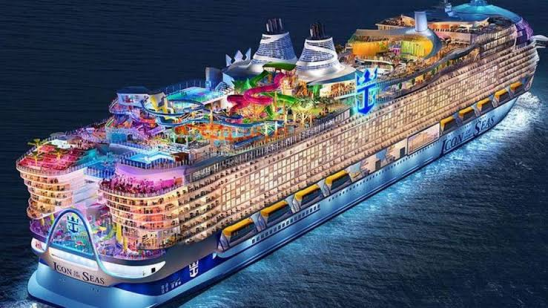
Are ‘Green’ Cruise Ships Truly Beneficial for the Climate?
By Fiona Nanna, ForeMedia News
9 minutes read. Updated 5:00PM GMT Fri, 28, 2024
Cruise companies around the world are increasingly promoting their green credentials. However, the question remains: can cruise ships ever truly be sustainable? This issue is gaining international attention as more travelers from around the globe consider the environmental impact of their vacation choices.
In January, the world’s largest cruise ship, Icon of the Seas, embarked on its seven-day maiden voyage from the Port of Miami. Built at a staggering cost of $2 billion (£1.6 billion) by Royal Caribbean, this colossal vessel boasts 18 decks, seven swimming pools, and over 40 restaurants, bars, and lounges. At 365 meters (1,195 feet) in length, it surpasses the Eiffel Tower by 35 meters (115 feet) and dwarfs the Titanic by nearly five times.
The Icon of the Seas is powered by liquified natural gas (LNG), which Royal Caribbean hails as the “cleanest-burning marine fuel available.” However, environmentalists argue that LNG is not as clean as it sounds. Methane, a potent greenhouse gas, can leak during the LNG process, contributing significantly to climate change. Over a 20-year period, methane is approximately 80 times more potent than carbon dioxide (CO2).
The Growing Environmental Footprint of Cruising
The cruising industry is expanding at an unprecedented rate. Ticket sales for 2024 have reached record levels, with projections indicating that 360 cruise ships will carry a total of 30 million passengers by year-end, a 9.2% increase compared to pre-pandemic 2019.
“The problem is that the number of cruise ships keeps growing, and the size of those cruise ships keeps growing as well,” says Constance Dijkstra, a shipping campaigner at the non-profit organization Transport & Environment. This trend is expected to exacerbate air and ocean pollution.
The Cruise Industry’s Environmental Impact
A large cruise ship can consume up to 80,645 gallons (304,593 liters) of marine fuel per day, according to research by the University of Colorado Boulder. Marine fuels, derived from fossil fuels, have a significant carbon footprint. Compared to other holiday types, cruises are particularly carbon-intensive. An analysis by the non-profit Friends of the Earth found that a passenger’s CO2 emissions on a cruise around Seattle are eight times higher than those of a land-based tourist in the same area.
The problem extends beyond CO2 emissions. In 2022, the 218 cruise ships operating in Europe emitted more sulfur oxides (SOx) than one billion cars combined, or 4.4 times more than all the cars on the continent, according to Transport & Environment. SOx can harm trees, contribute to acid rain, and negatively impact sensitive ecosystems. For humans, exposure to SOx can lead to respiratory issues.
“We continue to caution people: ‘If you’re concerned about the environment, perhaps think about another kind of vacation,'” says Marcie Keever, director of the oceans and vessels program at Friends of the Earth.
Comparatively, even the most efficient cruise ships emit more CO2 per passenger kilometer than a passenger jet, as reported by the International Council on Clean Transportation (ICCT).
The Waste Problem
Cruise ships also generate significant amounts of waste. In 2019, more than 31 billion liters (8.5 billion gallons) of toxic waste were discharged off the west coast of Canada by cruise ships traveling to and from Alaska.
As the cruising industry continues to grow, the challenge of making these floating cities sustainable becomes more pressing. While some companies are making efforts to reduce their environmental footprint, the scale and pace of these changes may not be sufficient to counter the industry’s overall impact. For environmentally conscious travelers, exploring alternative vacation options might be a more sustainable choice.
For more insights into sustainable travel and the environmental impact of different vacation types, visit our sustainable travel guide.
Related Articles:
- The True Cost of Your Cruise Vacation
- Eco-Friendly Travel: Alternatives to Cruise Ships
- Understanding LNG: Pros and Cons

